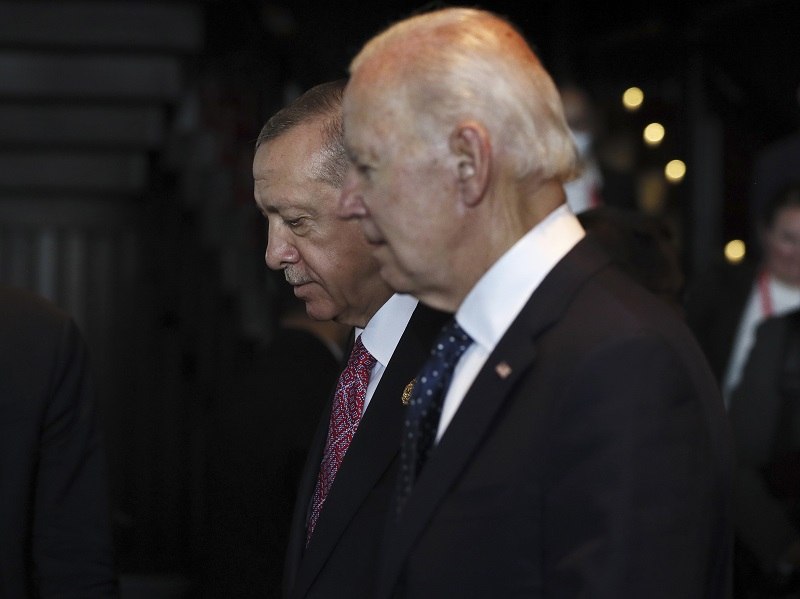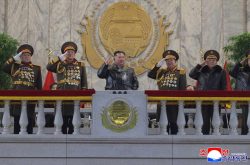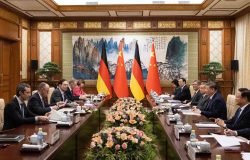
Turkish President Recep Tayyip Erdogan, left, walks with U.S. President Joe Biden during the G20 leaders’ summit in Nusa Dua, Bali, Indonesia, Nov. 15, 2022.
13:26 JST, December 4, 2022
BUCHAREST, Romania (AP) — Biden administration officials are toughening their language toward NATO ally Turkey as they try to talk Turkish President Recep Erdogan out of launching a bloody and destabilizing ground offensive against American-allied Kurdish forces in neighboring Syria.
Since Nov. 20, after six people died in an Istanbul bombing a week before that Turkey blamed, without evidence, on the U.S. and its Kurdish allies in Syria, Turkey has launched cross-border airstrikes, rockets and shells into U.S.- and Kurdish-patrolled areas of Syria, leaving Kurdish funeral corteges burying scores of dead.
Some criticized the initial muted U.S. response to the near-daily Turkish bombardment — a broad call for “de-escalation” — as a U.S. green light for more. With Erdogan not backing down on his threat to escalate, the U.S. began speaking more forcefully.
U.S. Defense Secretary Lloyd Austin called his Turkish counterpart on Wednesday to express “strong opposition” to Turkey launching a new military operation in northern Syria.
And National Security Council spokesman John Kirby on Friday made one of the administration’s first specific mentions of the impact of the Turkish strikes on the Kurdish militia, known as the Syrian Democratic Forces, that works with the United States against Islamic State militants bottled up in northern Syria.
How successfully the United States manages Erdogan’s threat to send troops in against America’s Kurdish partners over coming weeks will affect global security concerns far from that isolated corner of Syria.
That’s especially true for the Ukraine conflict. The Biden administration is eager for Erdogan’s cooperation with other NATO partners in countering Russia, particularly when it comes to persuading Turkey to drop its objections to Finland and Sweden joining NATO.
But giving Turkey free rein in attacks on the Syrian Kurds in hopes of securing Erdogan’s cooperation within NATO would have big security implications of its own.
U.S. forces on Friday stopped joint military patrols with the Kurdish forces in northern Syria to counter Islamic State extremists, as the Kurds concentrate on defending themselves from the Turkish air and artillery attacks and a possible ground invasion.
Since 2015, the Syrian Kurdish forces have worked with the few hundred forces the U.S. has on the ground there, winning back territory from the Islamic State and then detaining thousands of Islamic State fighters and their families and battling remnant Islamic State fighters. On Saturday, the U.S. and Kurds resumed limited patrols at one of the detention camps.
“ISIS is the forgotten story for the world and the United States, because of the focus on Ukraine,” said Omer Taspinar, an expert on Turkey and European security at the Brookings Institution and the National War College. ISIS is one widely used acronym for the Islamic State.
“Tragically, what would revive Western support for the Kurds … would be another ISIS terrorist attack, God forbid, in Europe or in the United States that will remind people that we actually have not defeated ISIS,” Taspinar said.
Turkey says the Syrian Kurds are allied to a nearly four-decade PKK Kurdish insurgency in southeast Turkey that has resulted in the deaths of tens of thousands of people on both sides. The United States’ Syrian Kurdish allies deny any attacks in Turkey.
U.S. Central Command, and many in Congress, praise the Syrian Kurds as brave comrades in arms. In July, Central Command angered Turkey by tweeting condolences for a Syrian Kurdish deputy commander and two other female fighters killed by a drone strike blamed on Turkey.
In 2019, a public outcry by his fellow Republicans and many others killed a plan by President Donald Trump, which he announced after a call with Erdogan, to clear U.S. troops out of the way of an expected Turkish attack on the Kurdish allies in Syria.
Then-presidential contender Joe Biden was among those expressing outrage.
“The Kurds were integral in helping us defeat ISIS — and too many lost their lives. Now, President Trump has abandoned them. It’s shameful,” Biden tweeted at the time.
The measured U.S. response now — even after some Turkish strikes hit near sites that host U.S. forces — reflects the significant strategic role that Turkey, as a NATO member, plays in the alliance’s efforts to counter Russia in Europe. The State Department and USAID did not immediately answer questions about whether the Turkish strikes had hindered aid workers and operations that partner with the United States.
Turkey, with strong ties to both Russia and the United States, has contributed to its NATO allies’ efforts against Russia in key ways during the Ukraine conflict. That includes supplying armed drones to Ukraine, and helping mediate between Russia and the United States and others.
But Turkey is also seeking to exert leverage within the alliance by blocking Finland and Sweden from joining NATO. Turkey is demanding that Sweden surrender Kurdish exiles that it says are affiliated with the PKK Kurdish insurgents.
Turkey’s state-run news agency reported that Sweden extradited a member of the PKK and he was arrested Saturday upon arrival in Istanbul.
Turkey is one of only two of the 30 NATO members not to have signed off yet on the Nordic countries’ NATO memberships. Hungary, the other, is expected to do so.
At a gathering of NATO foreign ministers in Bucharest, Romania, this past week, NATO diplomats refrained from publicly confronting Turkey, avoiding giving offense that might further set back the cause of Finland’s and Sweden’s NATO membership.
Turkey’s foreign minister made clear to his European counterparts that Turkey had yet to be appeased, when it came to Finland or Sweden hosting Kurdish exiles there.
“We reminded that in the end, it’s the Turkish people and the Turkish parliament that need to be convinced,” Turkish Foreign Minister Mevlut Cavusoglu told reporters on the sidelines.
U.S. Secretary of State Antony Blinken is expected to talk Thursday with Finland’s and Sweden’s foreign ministers on dealing with Turkey’s objections to their NATO accession.
Experts say the Biden administration has plenty of leverage to wield privately in urging Erdogan to relent in the threatened escalated attack on Syrian Kurds. That includes U.S. F-16 fighter sales that Turkey wants but have been opposed by Senate Foreign Relations Committee Chairman Robert Menendez and others in Congress.
There’s a third big security risk in the U.S. handling of Turkey’s invasion threat, along with the possible impact on the Ukraine conflict and on efforts to contain the Islamic State.
That’s the risk to Kurds, a stateless people and frequent U.S. ally often abandoned by the U.S. and the West in past conflicts over the past century.
If the U.S. stands by while Turkey escalates attacks on the Syrian Kurds who were instrumental in quelling the Islamic State, “especially in the aftermath of Afghanistan, what message are we sending to the Middle East?” asked Henri J. Barkey, an expert on Kurds and Turkey at the Council on Foreign Relations and at Lehigh University.
“And to all allies in general?” Barkey asked.
An ethnic group of millions at the intersection of Turkey, Iraq, Iran and Syria, Kurds lost out on a state of their own as the U.S. and other powers carved up the remnants of the Turkish Ottoman Empire after World War I.
Saddam Hussein and other regional leaders used poison gas, airstrikes and other tools of mass slaughter over the decades to suppress the Kurds. As under U.S. President George H.W. Bush in 1991 after the Gulf War, the United States at times encouraged popular uprisings but stood by as Kurds died in the resulting massacres.
On Nov. 28, hundreds of Syrian Kurds gathered for the victims of one of the Turkish airstrikes — five guards killed securing the al-Hol camp, which holds thousands of family members of Islamic State fighters.
Relatives of one of the Kurdish guards, Saifuddin Mohammed, placed his photo on his grave.
“Of course, we are proud,” said his brother, Abbas Mohammed. “He defended his land and his honor against the Turkish invading forces.”
Top Articles in News Services
-

Survey Shows False Election Info Perceived as True
-

Hong Kong Ex-Publisher Jimmy Lai’s Sentence Raises International Outcry as China Defends It
-

Japan’s Nikkei Stock Average Touches 58,000 as Yen, Jgbs Rally on Election Fallout (UPDATE 1)
-

Japan’s Nikkei Stock Average Falls as US-Iran Tensions Unsettle Investors (UPDATE 1)
-

Trump Names Former Federal Reserve Governor Warsh as the Next Fed Chair, Replacing Powell
JN ACCESS RANKING
-

Producer Behind Pop Group XG Arrested for Cocaine Possession
-

Japan PM Takaichi’s Cabinet Resigns en Masse
-

Man Infected with Measles Reportedly Dined at Restaurant in Tokyo Station
-

Israeli Ambassador to Japan Speaks about Japan’s Role in the Reconstruction of Gaza
-

Videos Plagiarized, Reposted with False Subtitles Claiming ‘Ryukyu Belongs to China’; Anti-China False Information Also Posted in Japan


























